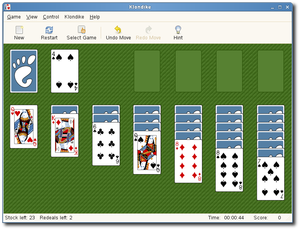



| A patience game | |
| Alternative names | Solitaire, seven up, sevens |
|---|---|
| Named variants | Agnes |
| Family | Klondike-like |
| Deck | Single 52-card |
Klondike is a patience game (solitaire card game). Many people refer to Klondike as patience or solitaire, it being one of the better known of the family of patience games.
 A GNOME version of Klondike.
A GNOME version of Klondike.After shuffling a standard 52-card deck (without Jokers), seven piles of cards are laid from left to right. Each pile begins with one upturned card. From left to right, each pile contains one more card than the last. The first and left-most pile contains a single upturned card, the second pile contains two cards (one downturned, one upturned), the third contains three (two downturned, one upturned), and so on, until the seventh pile which contains seven cards (six downturned, one upturned). The piles should look like the figure to the right at the beginning of every game.
The four foundations (light rectangles in the upper right of the figure) are built up by suit from Ace (low in this game) to King, and the tableau piles can be built down by alternate colors, and partial or complete piles can be moved if they are built down by alternate colors also. Any empty piles can be filled with a King or a pile of cards with a King. The aim of the game is to build up a stack of cards starting with two and ending with King, all of the same suit. Once this is accomplished, the goal is to move this to a foundation, where the player has previously placed the Ace of that suit. Once the player has done this, they will have "finished" that suit, the goal being, of course, to finish all suits, at which time the player would have won. There are different ways of dealing the remainder of the deck:
For a standard game of Klondike of the forms Draw 3, Re-Deal Infinite, and Win 52, the number of possible hands is over 7,000 trillion. About 79% of the games are theoretically winnable, but people do not win 79% of the games they start because they make a wrong move somewhere and lose the game prematurely. If one allows cards from the foundation to be moved back to the tableau, then between 82 and 91.5% are theoretically winnable. Note that these results depend on complete knowledge of the positions of all 52 cards, which a player does not possess. Another recent study has found the Draw 3, Re-Deal Infinite to have a 83.6% win rate after 1000 random games were solved by a computer solver. The issue is that a wrong move cannot be known in advance whenever more than one move is possible. The number of games a player can probabilistically expect to win is at least 43%. In addition, some games are "unplayable" in which no cards can be moved to the foundations even at the start of the game; these occur in only 0.025% of hands dealt.
There are four types of hands: winnable games, theoretically winnable lost games (the player made a selection that resulted in a lost game, but could not know what the correct selection was because the relevant cards were hidden), unwinnable games (there is no selection that leads to a winning result), and unplayable games.
There is a modified version of the game called "Thoughtful Solitaire", in which the identity of all 52 cards is known. Because the only difference between the two games (Klondike and Thoughtful) is the knowledge of card location, all Thoughtful games with solutions will also have solutions in Klondike. Similarly, all dead-ends in Thoughtful will be dead ends in Klondike. However, the theoretical odds of winning a standard game of non-Thoughtful Klondike are currently not known exactly. It has been said that the inability for theoreticians to precisely calculate these odds is "one of the embarrassments of applied probability".
One brute force attempt, based on a computer program playing 100 million (or slightly greater than 0.00000001%) of possible games predicts 8.7% win by clearing the table to the aces pile. However imperfect the algorithm is, it correctly predicted other results accurately (In about 1 in 102 games all black or all red cards were dealt. 1 x 25/51 x 24/50 x 23/49 x 22/48 x 21/47 x 20/46 =0.009834 or 1 in 101.69 deals).
Standard scoring in the Windows Solitaire game is determined as follows:
| Move | Points |
|---|---|
| Waste to Tableau | 5 |
| Waste to Foundation | 10 |
| Tableau to Foundation | 10 |
| Turn over Tableau card | 5 |
| Foundation to Tableau | -15 |
| Recycle waste when playing by ones | -100 (minimum score is 0) |
Moving cards directly from the Waste stack to a Foundation awards 10 points. However, if the card is first moved to a Tableau, and then to a Foundation, then an extra 5 points are received for a total of 15. Thus in order to receive a maximum score, no cards should be moved directly from the Waste to Foundation.
Time can also play a factor in Windows Solitaire, if the Timed game option is selected. For every 10 seconds of play, 2 points are taken away. Bonus points are calculated with the formula of 700,000 / (seconds to finish) if the game takes more than 30 seconds. If the game takes less than 30 seconds, no bonus points are awarded.
Below are some variations of the game of Klondike:
The game can be played with a Tarot-style 78-card deck (such as a Tarot Nouveau). There are two ways of doing this. Each has nine increasing tableau stacks.